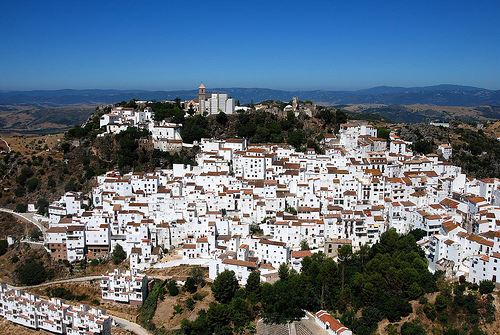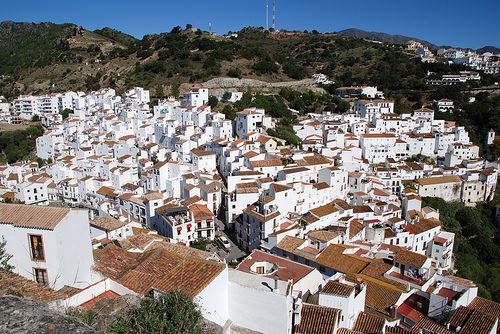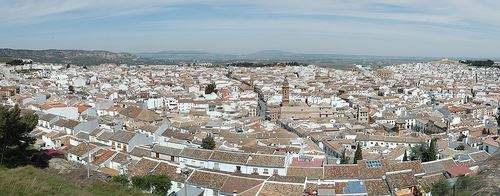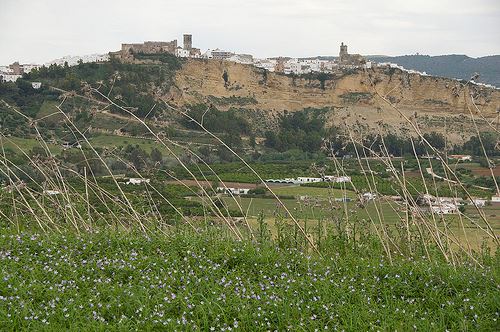Legal tip 627. Two good news coming out of the crisis: let´s name it HOPE!
Monday, October 31, 2011
TOWARDS THE END OF TAX EVASION
Fight against tax evasion to tax havens has raised 14,000 million euros, according to the OECD. The club of rich countries is estimated that this has occurred through the action of G-20 in the last two years. "This is an important contribution to fiscal consolidation," said the secretary general of the OECD, Angel Gurría.
The report highlights especially the fight against fraud in Italy, where 5,600 million has been raised since fall 2009, the United States (2,000 million) and Germany (1,800). Spain, meanwhile, have barely increased their revenue by 260 million.
"We're changing things," Gurria said in presenting the report, and placed the emphasis on changing the tax laws of 32 countries of the 59 examined by the Global Forum.
"The 14,000 million is the beginning," Gurria said, as he claimed the 700 bilateral agreements "are not applied yet and are not acting in the most effective way." In addition, there are cases of some covenants that are in place but do not work well, so that there is scope for further improvement, continued the Secretary General, who stressed that the aim is that information flows to ensure compliance with tax obligations.
FINANCIAL CONSUMER PROTECTION
Also, from the OCDE website reports that G20 finance :G20 finance ministers meeting in Paris have agreed new principles on financial consumer protection developed by the OECD.
The principles form part of a broader initiative by G20 leaders to strengthen trust and confidence in the financial sector, which is widely recognised to have fallen since the economic crisis.
“Without consumer trust and confidence we could jeopardise the basis for global economic recovery and growth,” said OECD Secretary-General Angel Gurría at a conference in Paris. “Individual households have had to bear the brunt of the consequences of this financial crisis. It has been a catalyst for developing new rules of the game to address financial governance and risks.”
OH YEAH! : Rule, maybe you should address Gurría regarding Law 57/68 and also coment with him on "daciones en pago rights" to those who were overlended during the crazy financial years.
“Financial consumer protection works best when accompanied by policies that promote access to affordable and appropriate financial products and services and through support for financial education and literacy interventions,” he said (Read the full speech).
These three pillars – protection, access, and education – should be integrated in the broader regulatory framework, alongside prudential regulation, governance and competition policies, the OECD said.
The principles were developed by the OECD at the request of G20 finance ministers in February 2011. They were developed in close co-operation with the Financial Stability Board, other international bodies and standard setters, and involved consultations with groups including consumer and industry associations.
Leaders will discuss the principles at the G20 Cannes Summit on 3 and 4 November 2011. “We believe that the G20 should continue putting an emphasis, not only on implementing the principles, but on forthcoming financial education issues,” said Mr Gurría.
More information on consumer protection is available at www.oecd.org/daf/fin/consumerprotection
More information on OECD work on G20 issues is available at www.oecd.org/g20
"Ojen", Malaga, Spain, by PILAR J, at flickr.com
 0
Like
Published at 1:26 PM Comments (0)
0
Like
Published at 1:26 PM Comments (0)
Legal tip 626. Wealth tax explained
Saturday, October 29, 2011
Wealth tax, if the new government do not delete it, will be on in Spain during 2011 and 2012. It is a direct tax on individuals and not on on companies. The taxable facts are merely the owning of goods and rights. Of course this restablished Wealth Tax is for RESIDENTS. So if you are a non resident, you will be paying your non resident tax annually ( 210 form) and do not need to worry about this.
Taxable amount is calculated by addding all goods and rights and substracting debts the individual have by December the 31st.
What goods and rights are included?
- Real Estate: value to be used is the higher among cadastral, revised value by Administration or acquisition price.
- Proffessional and commercial activities as per value established in the Code of Commerce.
- Bank deposits by higher value between December the 31st or average balance of 4th semester.
- Public debt titles, fixed income security or promissory notes of any listed market
- Cession of capitals to third parties in unlisted markets
- Shares in listed companies, including SICAVs, SOCIMIs and those holding companies where control is not effective. Watch out here as there are a number of exceptions to the taxation of these investments in companies based on ownership and effective control are not applicable in any case to SOCIMIs SICAVs
- Investments in unlisted companies, taking into account the criteria for exemption on beneficial ownership and control of the company.
- Life insurance and annuity or temporary income
- Jewelry, sumptuary furs and vehicles, ships and aircrafst
- Antiques and works of art.
- Any other economic rights
Regarding debts, the tax base will be reduced by all those debts who have incurred and are not earmarked to exempt estate assets such as the residence
After accounting of the items above, just those estates over 700.000 € will have to pay Wealth Tax
Wealth tax is a progressive tax that increases the rate applicable in terms of increased tax base. This taxable income is calculated by subtracting the taxable minimum and applying the following rates:
Base liquidable: Taxable amount
Hasta Eruos: Up to…Euros
Cuota: Quota
Resto base liquidable: Rest of taxable amount
Hasta Euros: Up to… Euros
Tipo aplicable: Rate
Porcentaje: Percentage

"Ojen", Malaga, Spain, by thrrgilag, at flickr.com
 0
Like
Published at 10:16 PM Comments (0)
0
Like
Published at 10:16 PM Comments (0)
Legal tip 625. Prince of Asturias and optimism
Friday, October 28, 2011
Spanish Conference for Directors and Executives ( CEDE) held in Bilbao were closed today by Prince Felipe of Asturias. He has asked directives to keep a leadership for the transmission of serenity and optimism which are essential for inspiring work on the rest of the workers.
" Not to drop one´s guard", " To lead optimistic and committed actitudes, characteristic of leaders so we can channel the future in a favorable way" " To escape from fatalism"
Again: Chin, Chin UP!!
.jpg)

"Casares", Malaga, Spain, by soulrider67, at flickr.com
 0
Like
Published at 9:22 PM Comments (0)
0
Like
Published at 9:22 PM Comments (0)
Legal tip 624. Chin up
Friday, October 28, 2011
That´s what good friend Justin ( yes... your Justin Aldridge), said to me today when I told him I was devastated after last redundancies in the company.
Thanks Justin, as always. Thanks for giving me voice :) through EOS during all these years and many to come, hopefully.
Once Banks put properties at the right price, and it is going to happen soon; there will be a beautiful market in Spain again: I am sure.
Yes, Chin Up you all!
Have a great weekend,
Maria
.jpg)

"Casares", Malaga, Spain, by AtilaTheHun, at flickr.com
 0
Like
Published at 7:23 PM Comments (1)
0
Like
Published at 7:23 PM Comments (1)
Legal tip 623. A growing business in Spain
Wednesday, October 26, 2011
A great idea, growing in Spain due to the big number of empty apartments: Holiday lets.
There is s tendency for international online hiring of apartments for vacations. Specially among the youngest.
Legal requirements:
For the owner: to register for VAT and, depending on regions,to register the
house/ apartment on the Tourism department. Some regulations already make obligatory for the owner to have indemnity insurance, but in any case, even if it is not obligatory by Law, it is always highly recommendable.
For the tenant: depending on regions, there are better or worse regulations in favour of consumers. We will be describing the different ones during the following days.
Banks…. Maybe you can start giving free stays to your clients instead of casseroles or TVs…. ;)
Good catering, cleaning, linen changing and touring companies will certainly make this also attractive for clients of older age too.
.jpg)

"Alcazaba de Antequera", Antequera, Malaga, Spain, by Cayetano, at flickr.com
 0
Like
Published at 10:10 AM Comments (0)
0
Like
Published at 10:10 AM Comments (0)
Legal tip 622. Homeschooling in Spain
Monday, October 24, 2011
Seven Questions and answers about homeschooling
Marta Vazquez - Reina
1. What is homeschooling?
The Association for Free Education (ALE), which represents many of the families who choose home education in our country, explained that homeschooling is about assume the education of children in an integral way: "both the aspects of acquisition of knowledge and skills, and the transmission of values and principles. " Thus, the schooling of children is not played in an educational institution and does not follow, in general, curriculum guidelines set by the government, but learning and formal and informal education takes place in the home environment.
2. Is it legal in Spain?
The Spanish Constitution recognizes freedom of teaching and the Declaration of Human Rights, the preferential right of parents to choose the kind of education that shall be given to their children. But unlike many other countries, in Spain, homeschooling is not explicitly recognized by the legislation on education. There is a significant loophole in this regard.
For this reason, at times, especially before a child absence to formal schools, the homeschooling families must deal with the Administration. However, in most cases, complaints are dismissed finding that there are not situations of truancy and that children receive adequate home care education. The Association for Free Education has on its website the details of the legal framework of homeschooling in our country.
3. Why choose this alternative?
As stated by Carlos cabo, institute professor and associate professor at the University of Oviedo, one can not speak of a specific family profile that chooses this option, "as they form a very heterogeneous group," but if there is anything that defines them is "the firm conviction in what they are doing and the strong links with their children."
According to data from a survey conducted by this researcher, pedagogical reasons are why most of these families are choosing homeschooling. Respect the individual rhythms of each child's learning, improve their inherent skills and abilities, learning in real situations and arouse interest, the critical spirit and the taste for knowledge are some key pedagogical aspects that seek to promote the education in the home.
4. What educational methodology is used?
Children who are educated at home, as well as those who attend the school, generally follow an academic program, but with the difference that this is designed and developed according to their rhythm, their motivations and abilities. Thus, learning is more attractive to the student. Methos often used are those which promote these guidelines, such as Waldorf or Montessori.
5. Do you resort to outside help?
Some home schooling families choose to enroll their children in a non-attendance school : (Conclara and Epysteme are the two main options in our country), which also offer educational materials and resources and other services such as tutoring and counseling .Depending on the level and age of the student as well as the preparation of parents, one can resort to external assistance from tutors to supplement the student's training. In many cases, children who are educated at home complement their training at home with extra program activities (sports, languages or music) that match their interests and allow them to function in another setting other than home.
6. Is it possible to achieve formal qualifications?
There are several options for children who are educated at home to obtain formal qualifications of the Spanish educational system:
* As per Education Law (LOE 2006), education authorities should ensure the enrollment of students who access the education system late and incorporate them to the course that best suits to their age and background characteristics. Thus, children who are educated at home can insert later ( in Primary and ESO) to school attendance in the course corresponding to their age, and obtain the Secondary Graduation Certificate.
* After 18 years, students can present exams to get the Secundary education certificate and from 20 years old, to obtain the certificate of high school.
* From the age of 17 can be accessed by a test of Medium grade Proffessional Formation and from the 19, the higher level of Proffessional formation.VET.
* Consider using a foreign distance teaching center (as Epysteme, Clonlara or academia Moore, among others) and then validate the title thanks to approval agreements established among several states.
7. Where can I get information?
* Association for Free Education: the website of this association of home schooling families have current information about this alternative education and answers to common questions about the legal framework surrounding the homeschooling in our country.
* Family Education Congress: access to all presentations and lectures by specialists who participated last year 2010 in the first specific homeschooling conference in Spain. The second edition will be held at the University of Navarra next November.
* The homeschooling option: This blog by Madalen Goiri contains interesting information, documents and experiences in homeschooling.
* Educate at the family: Catalan's Web. Coordinator for the Recognition and Regulation of Family Education, which includes teaching resources and materials useful for homeschooling families Siete preguntas y respuestas sobre el homeschooling
"027 Ant - Vista centro Antequera", Malaga, Spain, by Miradas de Andalucia, at flickr.com
 0
Like
Published at 4:37 PM Comments (0)
0
Like
Published at 4:37 PM Comments (0)
Legal tip 621. The cool tendency of cool developers in Spain
Sunday, October 23, 2011
is to offer properties just for the remaining debt the property have, the developer´s mortgage.
So great prices: for instance 2 bed apartment for 88k
I am not a sales agent but will be communicating this great bargains to you of course as I get to know them in our negotiations with developers on existing cases.
Cool!
.jpg)

"Panorama de Antequera", Malaga, Spain, by nfcastro, at flickr.com
 0
Like
Published at 11:06 PM Comments (0)
0
Like
Published at 11:06 PM Comments (0)
Legal tip 620. Nice free guide on wills and Inheritance tax in Spain
Sunday, October 23, 2011
For you to enjoy and share!
Click here
Thanks!
Maria
.jpg)

"Antequera", Malaga, Spain, by Antonio Martinez, at flickr.com
 0
Like
Published at 10:59 PM Comments (2)
0
Like
Published at 10:59 PM Comments (2)
Legal tip 619. Letter from CostaLuz. Number 2
Saturday, October 22, 2011
Dear clients:
We keep fighting very hard for the refund of your deposits, always looking more into finding Finantial institutions which guaranteed those refunds so we can enforce Court decissions against them. This week, we had a great new as a big bank ( BBVA) settled Out of Court in one of our claims based in provision 1segundo of Law 57/68.
The fight is not being easy as Courts are very overloaded, developers are bankrupt and, even when the conscience an energies for fighting against Banks is growing more and more, you can still feel yourself a bit small before the big boys. It depends on Judges. Some are more willing to understand that other ones are.
Also, the fact that we are having national ellections on the 20th of November makes the whole spanish society being kind of static, just waiting for the new to come.
We keep dreaming about having you happy back here in Spain as we are so certain that there is a place for you and yours. That is why we are also approaching some developers ( those we used to and still fight against) so they can offer to you their stocks. They are nice people in general who were overexcited by the growth of the industry during the boom years, encouraged by easy credit by... the Banks! I always think they were tools in hands of Banks.
These dealings with developers seem to be working fine. They see now that they need to be closer to you than to the heartless financial monsters. It is a win-win scheme. Some of them are offering our clients to just take their exisiting mortgages and have a house in Spain. Much lower prices than initial ones. If you are interested about knowing more about this, please send an email and let us know.
I am exhausted, but still feeling the deep passion of having british people living happily in Spain in the years to come.
Cheers!
Maria
.jpg)

"Arcos de la Frontera", Cadiz, Spain, by Chris Juden, at flickr.com
 0
Like
Published at 2:37 PM Comments (0)
0
Like
Published at 2:37 PM Comments (0)
Legal tip 618. BBVA settling out of Court
Tuesday, October 18, 2011
BBVA has settled out of Court for one of our clients using action against Bank due to lack of Bank Guarantee ( provision 1segundo of Law 57/68) which establishes that Bank needs to verify, under its liability, that the corresponding guarantees exist if they receive advanced amounts in off plan businesses.
Good sign of sensible behaviour by this Bank.
That might be one of the reasons there is no much Case Law for this type of action. They settle Out of Courts once this action is brought against them.
The settlement happened once our lawsuit had been served to them.
So very good news!
Maria
.jpg)

"Arcos (de la Frontera)", Cadiz, Spain, by Haddhar, at flickr.com
 0
Like
Published at 9:07 PM Comments (5)
0
Like
Published at 9:07 PM Comments (5)
Legal tip 617. A nice rental guide
Tuesday, October 18, 2011
 0
Like
Published at 2:29 PM Comments (0)
0
Like
Published at 2:29 PM Comments (0)
Legal tip 616. Starbuck´s and communities
Tuesday, October 18, 2011
From the Harvard Business Review:
Invest in Communities to Advance Capitalism
9:00 AM Monday October 17, 2011
by Howard Schultz | Comments (5)
This blog post is part of the HBR Online Forum The CEO's Role in Fixing the System.
I have long believed that innovation is not just about creating new products or services; it's also about rethinking the very nature of an organization's relationships.
Businesses have seen this unfold on at least two fronts during the past 20 years.
First, consider how the relationship between employers and employees has evolved from a paternalistic, command-and-control contract to a more collaborative, employee-driven model. Today, enlightened employers know that, if they want great people to perform at the top of their game, they must engage and care for employees' well-being on a variety of fronts that go beyond a paycheck. At Starbucks, this shift in values can be seen in the health-care coverage and stock options we have long offered to part-time employees.
More recently, another big relationship shift has occurred between companies and consumers. The most innovative brands have dramatically changed the way they connect with customers by supplementing traditional marketing and advertising with social and digital media. The medium changes the nature of the dialogue, something Starbucks has experienced firsthand with its own Facebook presence, Twitter activity, and in-store Starbucks Digital Network.
Now, a third relationship-driven innovation is under way, and it has the potential to improve not just our businesses but also the role of corporations, and thus capitalism, in society. Specifically, it's time to rethink how companies, both public and private, assist the communities we serve.
It is no longer enough to serve customers, employees, and shareholders. As corporate citizens of the world, it is our responsibility — our duty — to serve the communities where we do business by helping to improve, for example, the quality of citizens' education, employment, health care, safety, and overall daily life, plus future prospects.
We must act not because making a positive difference is a nice thing to do. The escalating crisis of confidence around the world is a phenomenon linked not only the global financial crisis but also to the uncertainty surrounding many governments — from the Middle East's transitional democracies and Europe's debt-strapped countries to the U.S.'s inability to collaboratively solve its own serious problems. With public leaders unable to adequately address the needs of their citizens and fix teetering economies, the responsibility to pick up the slack must shift to private organizations.
The solutions are not obvious. Writing checks for charity, for example, won't cut it. We must go deeper. We must invest the same creative muscle and resources we put toward our products into neighborhoods. We must ask how to fulfill the very real needs of communities in ways that are relevant to our business, take advantage of our strengths while being cost-effective and, yes, potentially profitable.
Again, this is not just about philanthropy. When looked at through the capitalistic lens, innovating the very nature of corporate-community relations is good business. Companies that hold on to the old-school, singular view of limiting their responsibilities to making a profit will not only discover it is a shallow goal but an unsustainable one. Values increasingly drive consumer and employee loyalties. Money and talent will follow those companies whose values are compatible with their own.
Quite simply, the time has come for corporations to extend their time, their products, their expertise, and their values in innovative ways. Two recent initiatives at Starbucks exemplify this point.
First, as part of our vision to further help the communities where we do business solve their own unique challenges, Starbucks has begun working closely with community-focused "change makers" — regional leaders and non-profits that are dedicated to improving the quality in their neighborhoods.
Designated Starbucks stores in the Harlem section of New York City and the Crenshaw district of Los Angeles will create training opportunities, host community meetings as well as share a portion of store profits to further progress on these and other fronts. For the first year Starbucks will donate a minimum of $100,000 to each organization, which in turn will promote our stores' community focus.
By plugging into local neighborhoods via an existing organization's programs and accountability metrics, we believe Starbucks can create more tangible, sustainable improvements. Other companies will, we hope, follow suit and find their own ways to support, effective change makers.
A second recent initiative is based on our belief that the core problem facing the U.S. in particular is high unemployment. After I personally asked CEOs to join me in accelerating job creation at their own companies, Starbucks asked itself how it might further use the company's scale for good. After much creative brainstorming, we came up with a unique initiative.
We began with the fundamental thought that we could help put Americans back to work if we first thawed frozen channels of credit in local communities, enabling small businesses to expand. Partnering with Opportunity Finance Network, a nationally recognized nonprofit, we established a fund to do just that: lend to small businesses, the primary creators of new jobs.
An initial $5 million to seed the fund will come from The Starbucks Foundation. Beyond that, every Starbucks customer who contributes $5 or more to the fund will receive a limited-edition red, white, and blue wristband with the word 'Indivisible' on the clasp. One hundred percent of the money raised into a nationwide fund will go to support small business lending.
This program, Create Jobs for USA, will begin November 1, 2011. I cannot predict the degree of its success, but I am incredibly proud of its intent as well as imaginative way in which it, too, redefines how Starbucks interacts with and serves communities in need.
We are not done. These two initiatives simply pave the way for us to have a more large-scale impact.
How can companies reinvent capitalism? By reimagining the ways in which we engage with communities.
There is no time to waste. None of us can wait for governments to create jobs, improve healthcare and strengthen any of the other safety nets our societies have come to expect and need.
Take a page from the playbook that makes us succeed in the marketplace and put the same resources and innovative muscle into redefining corporate citizenship. This is not charity. It's imperative. Let's get to work.
For more Schultz´s stuff, click here
.jpg)

"Arcos de la Frontera", Cadiz, Spain, by tiubuk, at flickr.com
 0
Like
Published at 12:22 PM Comments (0)
0
Like
Published at 12:22 PM Comments (0)
Legal tip 615. On when to offer Spanish wine
Monday, October 17, 2011
www.bankguaranteesinspain.com/PRESS RELEASE 14 OCT 2011.pdf
PRESS RELEASE
14 October 2011
ISSUED BY:
BANK GUARANTEES IN SPAIN ACTION GROUP
Highlighting Spanish Off-Plan Property Bank Guarantee Issues : Demanding Action
www.bankguaranteesinspain.com
SUBJECT: SPANISH GOVERNMENT PROPERTY ROAD SHOW
PHASE TWO – 13 OCTOBER 2011 – AT OPP LIVE – ExCel –
LONDON DOCKLANDS
BEATRIZ CORREDOR – SPANISH SECRETARY OF STATE
FOR HOUSING DELIVERS KEY NOTE SEMINAR SPEECH
AND ATTEMPTS TO EXPLAIN WHY NOW IS THE RIGHT
TIME TO INVEST IN THE SPANISH REAL ESTATE MARKET.
HOWEVER SHE FAILS TO ACKNOWLEGE THAT ANY
PROBLEMS EXIST WITH PREVIOUS PURCHASERS
POST SEMINAR DRINKS RECEPTION MARRED DUE TO
ANGRY EXCHANGES BETWEEN VICTIMS OF SPANISH
PROPERTY ABUSE AND SPANISH SECRETARY OF
STATE BEATRIZ CORREDOR
MARTA ANDREASEN MEP HAS FRANK EXCHANGE WITH
BEATRIZ CORREDOR AT POST SEMINAR DRINKS
RECEPTION
BANK GUARANTEE ACTION GROUP ATTENDS FOLLOW
UP MEETING WITH SPANISH GOVERNMENT OFFICIALS
FROM THE HOUSING MINISTRY
BEATRIZ CORREDOR REFUSES TO MEET PERSONALLY
WITH THE BANK GUARANTEES ACTION GROUP
Phase 2 of the Spanish Government Property Road Show arrived in London
Docklands yesterday where the ‘main event’ was a 30 minute ‘key note’ speech
from Beatriz Corredor, Spain’s Housing Minister.
The Road Show, which was part of the Property & Investor Show OPP Live,
consisted of a Spanish Government stand in the centre of the exhibition hall
around which 12 Government approved companies were provided with individual
podiums to market their real estate portfolios.
Throughout the day the Spanish area was fairly quiet and there was not much
evidence of prospective purchasers for Spanish Property. However, a number of
victims of various Spanish Property Abuses did make the exhibitors aware of their
problems.
At one point in the early afternoon it seemed as though many of the Spanish Real
Estate exhibitors had gone for lunch as most of the podiums were empty.
KEY NOTE SPEECH
At 3:15pm Beatriz Corredor delivered her ‘key note’ speech in a small seminar
room screened off from the main exhibition hall. The audience of around 70
people was made up of trade guests, individual investors, Spanish Government
Embassy Officials and a number of victims of property abuse in Spain.
The audience was provided with copies of the Spanish Government publication
‘How to buy a home in Spain – Step by Step Guide’.
Beatriz Corredor was introduced by the Spanish Ambassador to the UK, Sr. Carles
Casajuana. He advised the audience that instead of a question and answer
session at the end of the seminar Beatriz Corredor would host a drinks reception
where the audience could enjoy some Spanish Wine.
Her speech lasted for around 30 minutes and she explained how this was now the
optimum time to invest in Spanish Property due to the falling property prices, IVA
reduction on new properties, Land Registry searches now available in English and
the transparency and legal security available to purchasers. Significantly the
Minister failed to acknowledge that there were any problems within the Spanish
real estate sector.
DRINKS RECEPTION & CHALLENGE FROM MARTA ANDREASEN MEP
At the end of the seminar the audience was then taken to the drinks reception
hosted by Beatriz Corredor and the Spanish Government.
The drinks reception was marred by some angry exchanges between Beatriz
Corredor and victims of Spanish Property Abuse. Sra. Corredor attempted to
defend the Spanish Real Estate Sector and together with the Spanish Ambassador
they denied there were any major problems.
Marta Andreasen MEP who had flown into London specially to attend the seminar
in support of the victims of property abuse also challenged Beatriz Corredor at
the drinks reception. http://www.martaandreasen.com/?p=1011
Marta Andreasen comments: “It didn’t take me long to introduce myself to
the Minister and have a conversation with her. I shall describe it as
‘frank and passionate’, with the conversation both in English and Spanish
attracting attention from many around.
Mrs Corredor quite clearly lives on another planet. She refused to
acknowledge the problems there have been and continue to be with
people who have invested in Spain. Through her denial, she is unwilling
to help those who have suffered and I question whether she even cares
given there’s an election in Spain in a few weeks time”
REFUSAL BY MINISTER TO ATTEND MEETING
Keith Rule coordinator of the Finca Parcs Action Group and organizer of the Bank
Guarantees in Spain Petition says: “After listening to the Seminar from our front
row seats, it was obvious they did not want us anywhere near Beatriz
Corredor. Immediately the seminar ended myself and two other
representatives of the Bank Guarantees In Spain Petition, Mike Kerr and Reg
Matthews were taken for a pre-arranged meeting with two senior members
of Beatriz Corredor’s team.
We asked Beatriz Corredor to join the meeting but she refused. The meeting
which was a follow up to our first meeting held during the first phase of the
Road Show at the Spanish Embassy in May lasted for around 75 minutes and
at times became rather heated due to the serious nature of the subject
matter”
The meeting was arranged to discuss the wider issue of Bank Guarantee Abuse
including circumstances where developers and banks failed to issue the legally
required Bank Guarantees and where Banks were refusing to honour Bank Guarantees
for no legitimate legal reason.
COMPLAINT TO THE BANK OF SPAIN
Keith continues: “After reaching the end of the complaints procedure with Caja
de Ahorros del Mediterráneo (CAM) the Bank who accepted our off-plan
deposits at Finca Parcs we then forwarded our complaint to the Valencian
Savings Ombudsman who advised us that the complaint was ‘out of their
remit’ and then referred us to the Bank of Spain. We submitted our
complaint and dossier of evidence to the Banco de España on 12 October
2010. The complaint was not only in relation to the Finca Parcs/CAM
situation but it also criticized the Banco de España for their lack of
supervision with regards to the wider issue of Bank Guarantee Abuse.
The Banco de España notified us in writing on 3 January 2011 that they had
accepted our complaint into their system. We have not heard from them
since. We took this matter up with the Spanish Government at our meeting
in May and were now looking for some information on the progress of our
complaint. Unfortunately Beatriz Corredor’s team was unable to give us any
positive news.
Keith says: they told us: ‘Sra. Corredor has personally contacted the Governor
of the Bank of Spain but we are still waiting for an answer with regards to
your complaint. The Bank of Spain is independent and we as a Government
cannot tell them what to do. You must make a complaint to the Defensor del
Pueblo regarding the lack of response from the Bank of Spain. We will also
continue to chase them on your behalf’
Keith adds: ”We have now demanded a meeting with the Bank of Spain and
Beatriz Corredor’s team has assured us that although they are unable to
instruct the Bank of Spain to meet with us they will support us with our
request.
LAND REGISTRY SEARCHES – INNACURATE AND INCOMPLETE
At the meeting we also challenged many of the things said by Beatriz
Corredor during her 30 minute seminar.
We highlighted the fact that the information provided by the Spanish Land
Registry was inaccurate and we had with us copies of recent Land Registry
Searches for a property that was demolished in 2008, two other properties
that were issued with demolition notices in 2009 and a property that was
subject to Land Grab. The Land Registry searches did not make any
reference to these very serious issues.
The officials attempted to defend the Land Registry system which is all part
of their claim that the system now offers legal security and transparency by
saying that “The English translation system for the Land Registry was only
introduced in July this year and it would take a little time to be accurate.
They said ‘we have to start somewhere”. We then gave them evidence of the
fact that the documents we were referring to were actually in Spanish from
the Spanish Land Registry search and not from the new English system.
“We insist that buying a house in Spain has always been safe.” Beatriz Corredor
Spanish secretary of state for housing
During a recent interview with the BBC’s Sarah Rainsford, Beatriz Corredor said
“We insist that buying a house in Spain has always been safe”. When
pressed further on this issue she conceded, “Those who have had problems
are on the path to a solution”
http://www.bbc.co.uk/news/world-europe-15293808
Keith challenges the statement from Beatriz Corredor: ”This statement is
completely untrue. If as the Minster says, buying a house in Spain has
always been safe, then why are so many people suffering from issues
such as Land Grab, Demolition Orders, Ley de Costas and Bank Guarantee
Abuse? I am shocked that she can continue to make such inflammatory
and insensitive statements. If we are now on a ‘path to a solution’ the
least we deserve is to be told just how long that path is.
Sra. Corredor must understand that now is the optimum time to meet
with the victims and put in place measures to resolve the serious issues
that are still outstanding as a result of the complete lack of supervision
in the Spanish Real Estate Sector.
If the Spanish Government and Banco de España really want us to
believe that the Spanish Real Estate Sector is transparent and offers
legal security then they must stop papering over the cracks and act now
to resolve the outstanding issues.
Now is not the time for Sales Seminars and Road Shows; it is time for
some real action from the Spanish Government and Banco de España.
We are sick of hearing about the transparency and legal security on offer,
because all we have experienced and are still experiencing is the
complete opposite – corruption, fraud, negligence and continual denial.
The Spanish Government must immediately clean up the property sector,
take action to resolve the property abuses, give more power to the Banco
de España to make them an effective supervisor of the Banks and ensure
that the Law relating to off-plan property purchases, LEY 57/68 is
enforced in all cases both past and present.
We have made it clear to the Spanish Government that we will not go
away and that will continue to fight to recover our money that should
have been protected by the inalienable rights granted to us by Spanish
Law, LEY 57/68”
Mike Kerr who was also present at the meeting comments: “I was disappointed
that I was not allowed to speak directly to Beatriz Corredor. As I
approached her she turned her back on me and walked away. We have
made the Spanish Government fully aware of the fraudulent actions of
the Spanish Banks but are surprised that they still refuse to intervene to
change their behaviour. By failing to take action it could be said that they are condoning the fraudulent activity of the banks”
-Ends-
_______________________
BANK GUARANTEE PROBLEM?
CLICK HERE TO JOIN THE PETITION
  
fpag@btinternet.com
.jpg)

"Arcos de la Frontera", Cadiz, Spain, by Sarah and Lain, at flickr.com
 0
Like
Published at 7:16 PM Comments (0)
0
Like
Published at 7:16 PM Comments (0)
Legal tip 613. Property real prices finally here
Tuesday, October 11, 2011
Pain before life
as it is always
PP is preparing a comprehensive reform of the financial sector, to promote a second round of bank mergers and, above all, to clean up bank balance sheets as soon as possible, although this then will require a new-and wide-round of recapitalization. The economic team of the PP believes that the remodeling sector is not over, since the entities are still suffering a surfeit of troubled assets, mainly from real estate and largely because of this circumstance, credit does not flow to the "big job creators," which are SMEs, according to the PP.
PP will request, by force of Bank of Spain order to “assess such assets to their real value and record the corresponding losses and to show red numbers as soon as possible" We must accept the financial losses to clean the balances," says Alvaro Nadal, secretary of Economy of the PP, to Expansion.
Cristobal Montoro added that this should have been done at the beginning of the financial crisis, but the sooner the better.
Genova's economic team believes that this amendment will make the credit flow again toward entrepreneurship, as so far the banks have been focused on recouping those bad assets and this has stopped crediting and has raised interest rates for the rest of the companies.
"Those who produce and create jobs cannot do it; due to lack of credit and those who are not producing have all the credit, as developers”
PP is also sure that through this consolidation, “houses will come out to the market faster and with greater discounts. This will help to finally digest the stock ". It is estimated that financial institutions have assumed a surplus of some 200,000 properties. There is no doubt that the reform will be very unpopular in the financial sector, but Nadal replied: "This is independence."
Keith Rule: go quickly and talk with this people about Law 57/68!
"Arcos de la Frontera", Cadiz, Spain, by tiubuk, at flickr.com
 0
Like
Published at 8:52 AM Comments (1)
0
Like
Published at 8:52 AM Comments (1)
Legal tip 612. Keys back to the Bank: Girona Court
Monday, October 10, 2011
Recent October 2011 Girona Appeal Court has endorsed the view that it is “contrary to the principle of good faith" that the banks continue to demand the repayment of the debt to a family that has already been evicted from his house.
Girona follows Navarre´s decision of last December in this same sense and believes that the financial performance of Deutsche Bank is "contrary to the principle of good faith that should govern the exercise of law."
The Court explains that the bank is trying to obtain an unjustified benefit and that Courts must look for those answers which, without violating Law, are more relevant to a fair decision" and choose a solution that "does not include an unjustified benefit for that part which is involved in a strong position in the signing of a contract of adhesion.”
.jpg)

"Arcos de la Frontera", Cadiz, Spain, by tiubuk, at flickr.com
 0
Like
Published at 7:12 PM Comments (0)
0
Like
Published at 7:12 PM Comments (0)
Legal tip 611. Aids for Investing in Spain
Thursday, October 6, 2011
From the InvestinSpain website
Technological Fund of INVEST IN SPAIN
Calls

| Convocatoria |
Call for aid applications 1/2011 under the program "Promotion of Establishment of foreign companies" |
| Status |
Open for submission |
| Amount |
2,000,000 € |
| Notice Details |
The call includes a diverse set of measures, all aimed at promoting R&D&I in companies with foreign capital wishing to set up operations in Spain or those already established in the country who wish to begin R&D&I activities.
The aid categories are as follows:
- Aid for pilot studies aimed at setting up company activities
- Setting up company activities
ITEMS ELIGIBLE FOR AID:
- Staff costs
- Equipment and materials costs
- Buildings and land costs
- Costs pertaining to contractual research, technical knowledge and patents acquired or obtained under licence
- General supplementary costs
- Other operating costs
BASIC PERCENTAGE ELIGIBLE FOR AID
Depending on the type of projects implemented by the company, the eligible percentage will be as follows:
Maximum 80% of the investment deemed eligible for small companies in Industrial research and 60% of the investment deemed eligible in Experimental development.
Basic Selection Criteria:
- Greater company resources allocated to R&D&I
- Increase in the level of technology contributed in the form of patents, licenses, etc.
- Evaluation of the direct, indirect and resulting effects
- Clustering effect of the project on the regional/national economy
- Strategic interest of the technologies to be developed in Spain
- Promotion of partnership agreements among private agents
- Promotion of public/private partnership agreements (PPP)
The time period eligible for aid will be from March 1, 2012 to February 28, 2013.
The activities to be funded must take place in some of the following areas according to the Regulation (EC) no. 1080/2006 of the European Parliament and Council of 5 July 2006: convergence area (Galicia, Andalucia, Castilla-La Mancha and Extremadura); and "phasing out" area (Asturias, Murcia, Ceuta and Melilla).
|
| Application deadline |
02|29|2012 |
| Additional information |
For further information: INVEST IN SPAIN- Technology Fund Unit / T (+34) 91 503 5813 / infofeder@investinspain.org |
| Documents |
 Call INVEST IN SPAIN 1/2011 Call INVEST IN SPAIN 1/2011
 Application form Application form |
If you need our legal help regarding this call, please email us to web@costaluzlawyers.es
.jpg)

"Arcos de la Frontera", Cádiz, Spain, by Wedge_II, at flickr.com
 0
Like
Published at 3:11 PM Comments (0)
0
Like
Published at 3:11 PM Comments (0)
Legal tip 610. What Norwegians see
Wednesday, October 5, 2011
Norwegians see Spain as a country with a great potential for long-term growth, which has led its sovereign wealth fund, the second largest in the world, to prioritize their investments in this country from the rest of the European countries.
This fund, administered directly by the Norwegian Central Bank without government intervention, has invested around 20 billion Euros in government bonds, in different Spanish autonomous communities, as well as in shares of various companies and banks.
"One in five" Norwegians visited Spain this year and there are more than 50,000 living here year-round
Yes, Spain is a country with a great future. Do not miss it!
Cheers,
María

"Arcos de la Frontera - Cliff town", Arcos, Cádiz, Spain, by dirk huijssoon, at flickr.com
 0
Like
Published at 8:39 AM Comments (1)
0
Like
Published at 8:39 AM Comments (1)
Legal tip 608. Buyers and developers united vs banks
Tuesday, October 4, 2011
As an answer to this thread of the forum:
As soon as claims against the Banks finally consolidate, they will not be in that dominant position within the real estate industry in Spain anymore and life will get back.
- Claims by individual buyers: enforcing Bank Guarantees, effecting general Guarantees and using provision 1segundo of Law 57/68
- Claims by developers: on Bank´s breaches of financial agreements between them two.
The expected formula for claims: buyers and developers togethers vs Banks is being the perfect mixture for advancing on Market balancing.
We are helping developers in our mission to help buyers and try to organise a more balanced market. It is being a huge effort! At the end of the day, both developers and buyers, were victims of the voracity of finantial institutions during the boom years.
.jpg)

"Anticipation: ronda, lauria - before feria", Ronda - Malaga, Spain, by Sean Wallis, at flickr.com
 0
Like
Published at 1:04 PM Comments (0)
0
Like
Published at 1:04 PM Comments (0)
Spam post or Abuse? Please let us know
|
|